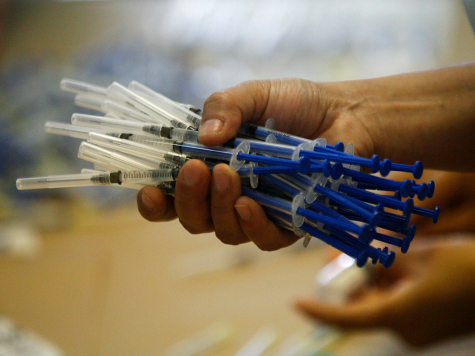Experts believe a new strain of malaria, which is resistant to drugs, is a “disaster in the making” in Thailand. The massive outbreak is on the Thailand-Myanmar border, but popped up in Vietnam and Laos.
“It’s already a disaster in the making, and as physicians we have to raise the alarm,” said Professor Francois Nosten, director of the Shoklo Malaria Research Unit. “We have to do something. We should have declared a global emergency once we understood that the parasite had changed its genome and become resistant to the latest drugs we have.”
The Malaria drug Artemisinin is derived from the Chinese sweet wormwood plant. The World Health Organization (WHO) recommends Artemisinin-based combination therapies (ACTs) to treat malaria. In April 2014, WHO said patients in Cambodia, Laos, Myanmar, Thailand, and Vietnam showed resistance to the drugs, but could not determine exactly why the drugs do not work. WHO shared the same concerns as Dr. Nosten. From WHO:
Resistance is occurring as a consequence of several factors, including poor treatment practices, inadequate patient adherence to prescribed antimalarial regimens, and the widespread availability of oral artemisinin-based monotherapies and substandard forms of the drug.
Given the ever-increasing levels of population movement in Asia and the Pacific, the geographic scope of the problem could widen quickly, posing a health security risk for many countries in the region with ongoing malaria transmission. If resistance were to spread to – or emerge in – India or sub-Saharan Africa, the public health consequences could be dire, as no alternative antimalarial medicine is available at present with the same level of efficacy and tolerability as ACTs. There is therefore a limited window of opportunity to avert a regional public health disaster, which could have severe global consequences.
“Once you go to India and to Africa, here you are talking about potentially hundreds of millions of people affected,” said Professor Nicholas White, a senior author of a study on the disease at the Mahidol Oxford Tropical Medicine Research Unit in Bangkok.
Doctors identified the strain in 2007 along the Thailand-Cambodia border. Doctors worry the disease might spread to India and Africa, which is still fighting an Ebola outbreak. A previous strain, resistant to chloroquine, broke out in the same border towns years ago. It took over a decade to reach Africa, but this strain could reach the continent much sooner.
“The price of our inability to contain it in South East Asia was millions of deaths — millions of children died,” White said. “We mustn’t let that happen again. This time it will probably move faster, because people move faster these days.”
Unfortunately, Nosten and White do not have a quick fix for the parasite. The doctors developed a controversial plan to fight the disease, especially since some infected patients carry “the parasite without falling sick.” Norsten and White want to “[F]lood the borderlands with anti-malarial drugs to be taken by everybody, sick or not, to eliminate the parasite once and for all.” Nosten medicated four villages in Myanmar. He admitted the plan is not perfect, but the doctors “have to do everything we possibly can to stop it.”

COMMENTS
Please let us know if you're having issues with commenting.